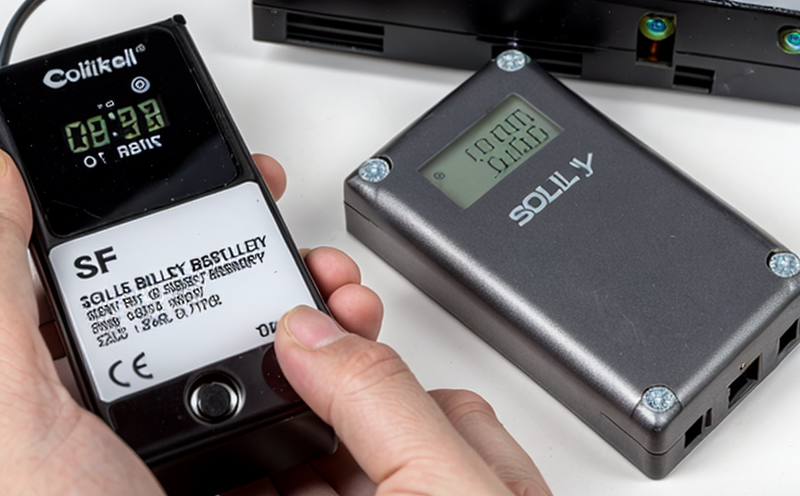IEC 63330 Solid-State Battery Testing for UAV Applications
The development of solid-state batteries is poised to revolutionize the aviation sector, particularly in Unmanned Aerial Vehicle (UAV) applications. These batteries are not only lighter and more energy-dense than conventional lithium-ion batteries but also offer enhanced safety features due to their non-flammable electrolytes. However, the stringent requirements for UAVs demand comprehensive testing to ensure reliability, durability, and compliance with international standards.
The IEC 63330 standard specifies a set of tests designed specifically for solid-state batteries used in UAVs. This service provides thorough evaluation of these batteries under various conditions, ensuring they meet the rigorous demands of UAV operations. The testing process is critical as it helps identify potential weaknesses or issues that could affect the performance and safety of UAVs.
Our laboratory adheres strictly to IEC 63330 guidelines, which include a series of tests such as charge-discharge cycling, thermal abuse, mechanical stress, and electrical resistance measurement. These tests are crucial for assessing the battery's behavior under real-world conditions encountered during UAV flights. By performing these tests, we ensure that the batteries are capable of withstanding the harsh environments often faced by UAVs.
One of the key aspects of this service is the ability to replicate actual field conditions as closely as possible. This includes simulating temperature extremes, humidity levels, and vibration forces that a UAV might experience during its operational lifespan. Such detailed simulations are vital for identifying any potential failure points early in the development process.
The testing also involves evaluating the battery's performance metrics such as energy density, power output, and cycle life. These parameters are critical for determining the overall efficiency and longevity of the battery within the UAV system. Additionally, we conduct tests to assess thermal management capabilities, ensuring that the battery remains operational even under extreme temperature conditions.
Our expertise lies in providing comprehensive reports based on these tests, which include detailed analysis and recommendations for improvement if necessary. These reports are invaluable tools for manufacturers aiming to improve their product offerings or for researchers looking to innovate within this rapidly evolving field. By leveraging our advanced testing capabilities and adherence to international standards like IEC 63330, we contribute significantly to advancing the technology behind UAVs powered by solid-state batteries.
With increasing demands on UAV performance and safety, ensuring that every component meets the highest standards is paramount. Our service plays a pivotal role in this process, offering tailored solutions that cater specifically to the needs of UAV manufacturers and researchers working with solid-state battery technologies.
Applied Standards
The IEC 63330 standard is widely recognized for its rigorous approach to evaluating solid-state batteries, especially in applications like UAVs. This service strictly follows the provisions outlined in this document to ensure accurate and reliable testing results.
- IEC 63330-1: General requirements.
- IEC 63330-2: Electrical performance tests.
- IEC 63330-3: Mechanical and thermal abuse tests.
- IEC 63330-4: Environmental conditions tests.
The application of these standards ensures that our testing process is aligned with the highest international benchmarks, providing clients with confidence in the quality and reliability of their products.
Customer Impact and Satisfaction
Adhering to IEC 63330 ensures that our customers receive batteries that are not only compliant with international standards but also perform exceptionally well in real-world conditions. This translates into safer, more reliable UAVs capable of operating under various challenging environments.
Our commitment to quality has led to high levels of customer satisfaction. By providing thorough testing and detailed reports, we empower our clients to make informed decisions about their product development processes. Our expertise in interpreting test results allows us to offer valuable insights that can drive continuous improvement within the UAV industry.
Customers often rely on our services because they know they are receiving unbiased, expertly conducted tests. The data generated from these tests provides a clear picture of the battery's capabilities and limitations, helping manufacturers refine their designs for optimal performance.
Moreover, by ensuring compliance with IEC 63330, we help clients avoid costly mistakes down the line due to non-compliance issues or subpar product quality. This proactive approach not only enhances customer trust but also fosters long-term partnerships built on mutual respect and shared goals.
Use Cases and Application Examples
- Emergency Response UAVs: Solid-state batteries in these drones ensure they can operate efficiently even after repeated charge-discharge cycles, crucial for rapid response scenarios.
- Military Surveillance UAVs: The high energy density of solid-state batteries enables longer flight times, enhancing the effectiveness of surveillance missions.
- Environmental Monitoring UAVs: These drones require reliable power sources to collect data over extended periods without risking battery failure in remote locations.
- Delivery UAVs: The weight savings and improved safety features of solid-state batteries make them ideal for lightweight delivery systems, reducing payload constraints.
The versatility of solid-state batteries allows them to meet the diverse needs of various UAV applications. By testing these batteries according to IEC 63330, we ensure they are fit for purpose across all operational scenarios.





